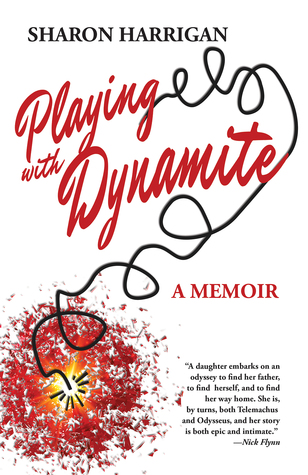Playing With Dynamite by Sharon Harrigan
Sharon Harrigan’s father was larger than life, a brilliant but troubled man who blew off his hand with dynamite before she was born and died in a mysterious and bizarre accident when she was seven. The story of his death never made sense. How did he really die? And why was she so sure that asking would be dangerous? A series of events compel her to find the answers, collecting other people’s memories and uncovering her own. Her two-year odyssey takes her from Virginia to Detroit to Paris and finally to the wilds of northern Michigan where her father died. There, she discovers the real danger and has to confront her fear.
Playing with Dynamite is about the family secrets that can distance us from each other and the honesty that can bring us closer. It’s about a daughter who goes looking for her father but finds her mother instead. It’s about memory and truth, grieving and growing, and what it means to go home again.
(A copy of this novel was provided in exchange for an honest review)
It’s always interesting for me to read memoir because I never really know what to expect. The execution is so widely varying, it’s hard to know what kind of story you’re in for before you read it. Whenever someone recommends a work of memoir to me or gives me one to read, I’m always a little hesitant. There’s this feeling that if you didn’t like the memoir for some reason, it’s kind of like you’re invalidating someone’s life experiences. I know it’s not exactly like that, but it feels that way to me.
Playing With Dynamite is one of the lovely ones. Sharon Harrigan’s style is so engrossing, it’s hard to extricate yourself from it and put the book down. I started the book with the intention that I would at least start it so I could judge how long I would need to finish it, but before I knew it, I had read half of it and hadn’t touched either of the books for my upcoming bookclubs.
In the acknowledgements, Sharon Harrigan mentions that parts of the book were published as individual essays. I can feel that. Sections of the book hang together really, really well. Which doesn’t mean the whole thing doesn’t work together. Quite the contrary. Somehow Playing With Dynamite seems to straddle a rare line in writing. Whether you have time for just a small section, a part, or the whole book, Playing With Dynamite manages to engage and delight at every reading experience, leaving you feeling satisfied no matter where you had to leave off.
Beautifully written, engrossing, and artfully structured, it reminded me a lot of The Glass Castle. Both stories feature dysfunctional families, so if you liked The Glass Castle, you will probably enjoy Playing With Dynamite, though Harrigan’s family is a lot less dysfunctional that Walls’.
This is Harrigan’s first book and I am looking forward to her future titles!




